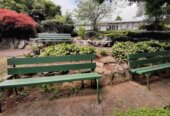Did you read the marvellous story about Paihia in last week’s news about how the community resolved a tricky problem?
They had problems with a reserve at the end of the town, around a headland, largely out of sight. It featured public toilets and a shingle carpark designed to allow beach access, but little else to attract locals or visitors to use the area. Instead, alcohol and drugs users gathered, rubbish accumulated, and antisocial behaviour escalated. Locals were completely avoiding the area, becoming more and more concerned at this dark blot on their otherwise inviting town. What to do?
Rather than try to legislate against gatherings, fence the area off, or even add cameras or lighting as deterrents, Paihia residents decided on a positive rather than punitive response. They decided to make the area attractive – put in a playground, improve facilities, incorporate plantings, barbecues and picnic areas. The outstanding thing about this story for me was that there was no council funding available for this work, so the community achieved it through generous donations of money, equipment, and volunteer labour in community working bees.
Architects have long argued that the built environment can have a profound effect on human behaviour, which this Paihia project serves to affirm. But it is the underlying philosophy that I believe we can all learn from. It is that people and communities do best when the best is offered to them. Jesus emphasised this message over and over again. Even when faced with his ultimate betrayer, Judas, who was posing as an ally, Jesus treated him with compassion.
When a rabbi asked Jesus which was the greatest commandment of all, Jesus answered, “Love the Lord your God with all your heart and with all your soul and with all your strength and with all your mind and Love your neighbour as yourself.” (Luke 10:27) Surely, one way to love our neighbour is to ensure they have an environment to thrive in.

The community always turns out to help at Te Awamutu Memorial Park.
Are there areas in Te Awamutu that could benefit from a positive make over? Community groups in the past have worked with council to create the parks and facilities we now have. Some are well maintained and well used, but not others. We know from recent reporting that our council is reviewing all its expenses, an already stretched budget exacerbated by the coalition government’s revoking of the Three Waters reforms means council will not now be able to rely on central government funding for management of water. Are there ways we can support our council, working alongside them to keep areas welcoming and to be a community where everyone can thrive? Even more, can we take hold of Jesus’ teaching so that it changes our architecture, our attitudes, our hearts?
Waipā council’s finances are stretched, so rates will need to increase. Whenever that happens a torrent of criticism is released against council. If we took Jesus’ teaching to heart, we would instead be encouraging those people who are willing to make the hard decisions for us. Can Te Awamutu emulate Paihia’s community effort?

Julie Guest








